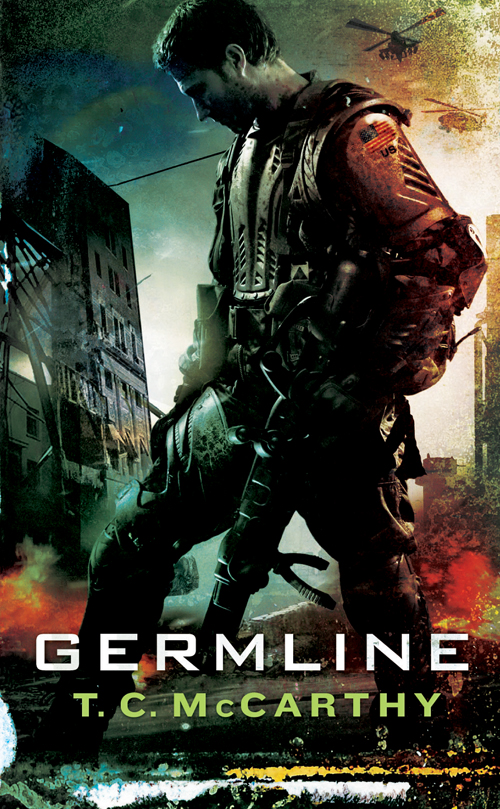Germline, TC McCarthy
/ A common talking point that I’ve found when it comes to military science fiction is that it's not a game. War is more than a bunch of soldiers dressed up in powered armor, shooting at aliens or their enemies, and telling a good story set against a backdrop of an epic war that pits the good guys against the bad guys. More than its surrounding features, military science fiction is a way to look at the present day. Germline, by TC McCarthy is a book that really gets the complexity, danger and horrors of warfare. It's the shock to the system that the first World War was to the civilized world, where they saw, first-hand, that war is a cruel and unforgiving institution.
A common talking point that I’ve found when it comes to military science fiction is that it's not a game. War is more than a bunch of soldiers dressed up in powered armor, shooting at aliens or their enemies, and telling a good story set against a backdrop of an epic war that pits the good guys against the bad guys. More than its surrounding features, military science fiction is a way to look at the present day. Germline, by TC McCarthy is a book that really gets the complexity, danger and horrors of warfare. It's the shock to the system that the first World War was to the civilized world, where they saw, first-hand, that war is a cruel and unforgiving institution.
Set at some point in the reasonably near future, the United States is at war with Russia. The battlegrounds are the mountains of Kazakhstan, where the war has dragged on in brutal fashion. Oscar Wendell is a reporter for Stars and Stripes, dropped in on the front lines to report on the progress of the war, where he's caught up amongst the soldiers that he befriends, and alongside the genetically engineered soldiers designed to take on the hardest battles.
One of the first novels that I've picked up that really seems to be influenced by the past decade of war in the Middle East (the other being Dan Abnett's Embedded), and it's a pleasant surprise to see the book draw from ideas other than the American experience in the Second World War or abject American exceptionalism. This feels like a book with less a political or national agenda, and one aimed far closer to the idea that warfare is, at its core, a horrible experience that should be avoided on the policy level.
Germline hits some snags early on, and takes a little while for it catch it's breath. For most of the book, I was wavering between liking the book for its message, and frustrated at points for some of the execution. Oscar is bounced from place to place, seemingly without warning, cause or purpose, as the war just drifts along. Key characters and moments that feel like they're supposed to take on far more significance pass by quickly, and a couple of personal issues that Oscar has are focused on and then dropped. Looking back, the ground-view experience from Oscar feels authentic, from his interactions with the US Marines in the beginning of the story, to the simple chaotic nature of his movements: this isn't a book that really looks at the war sans blinders. It's a tiny piece of a greater conflict, and within that context, it does a remarkable job.
For all of my misgivings, several of the complaints that I had about the story evaporated when I read a review that spoke a bit about the First World War experience, when everything began to fall into place. For all that warfare can be explained through charts, power point slides, rank structures, and the combat readiness statistics that are out there to explain why going to war is sometimes needed, it simply cannot explain away the experiences of a person on the front lines, no matter what the objectives are.
Reaching the last couple of chapters of Germline, it's clear that McCarthy gets warfare: his short bio includes a coy reference to his experiences as an analyst for the Central Intelligence Agency during the opening days of the 'War on Terror'. The final, key part of the book shows us everything about how warfare is all but unknowable to the people who haven't experienced it. (I'd like to think that studying it provides some level of insight)
When it comes to much of the military science fiction that's out there - and there's a wide variety of what's available - this book stands apart because it so intensely focuses on the people caught up in the middle of the war. They don't care about the larger parts of the strategy that's required, nor the theory behind it, but at the people at the other end of their rifles. There's other books that have focused on the characters, but there's none that I've really come across that drives the point home so effectively.
War, at the end of the day, is complicated. It's rarely as clear cut a story of overwhelming good verses overwhelming evil. It's far more than strategy, while it's also far more than just the soldier's perspective. While I found parts of Germline underwhelming in some of its details, I found that it was more than a match for my expectations in other arenas: a good lesson to internalize. Moreover, the book outlines some outstanding points about how we as a society deal (or fail to deal) with the institution of warfare: the people who experience warfare firsthand deserve a major amount of respect for what they've experienced and survived, and in some cases, are still dealing with.
